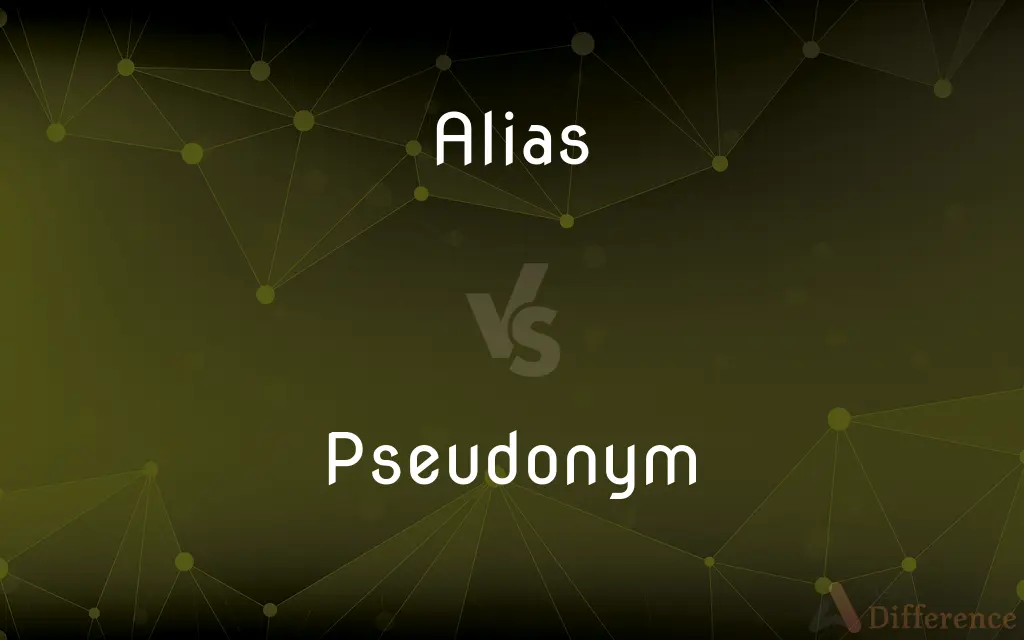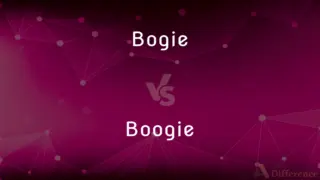Alias vs. Pseudonym — What's the Difference?
By Maham Liaqat & Fiza Rafique — Updated on March 14, 2024
An alias is a false or alternate name used for concealment or anonymity, often in legal or espionage contexts. A pseudonym, on the other hand, is a fictitious name adopted by authors and artists to mask their identity, typically used for stylistic.

Difference Between Alias and Pseudonym
Table of Contents
ADVERTISEMENT
Key Differences
An alias is primarily used as a tool for concealment or protection, allowing individuals to operate under a different identity to safeguard their privacy or to undertake covert activities. This is particularly common in legal scenarios, witness protection, or espionage. Whereas a pseudonym serves as a creative or professional mask, allowing writers, artists, and entertainers to separate their personal lives from their professional endeavors. It's a choice often driven by the desire for privacy, branding, or to avoid prejudice.
While an alias can be adopted quickly and used temporarily depending on the situation's requirements, a pseudonym is generally used more consistently within a particular professional field or artistic endeavor. For instance, a spy might use multiple aliases in different operations, whereas an author tends to stick with the same pseudonym across their publications to build a reputation.
Aliases are often associated with a need for legal anonymity or protection, possibly implying a direct threat to the individual's safety or privacy. On the other hand, pseudonyms, while they can also protect privacy, are frequently used to overcome societal biases, market one's work more effectively, or simply to create a distinct authorial identity that is separate from the individual's legal identity.
In terms of legal recognition, aliases might not be officially documented or recognized by legal authorities unless they are part of a witness protection program or a similar legal arrangement. Pseudonyms, however, can achieve a level of formal recognition, especially when an author or artist chooses to copyright or publish work under their fictitious name.
Despite their differences, both aliases and pseudonyms serve the purpose of concealing one's true identity, but the intent and context of their use significantly differ. An alias is more about protection and anonymity in potentially dangerous or secretive situations, while a pseudonym is about branding, creativity, and sometimes, privacy in a public and professional context.
ADVERTISEMENT
Comparison Chart
Primary Use
Concealment, protection, anonymity
Professional or artistic identity
Context
Legal, espionage, witness protection
Literature, arts, entertainment
Intent
Safety, secrecy
Branding, privacy, overcoming bias
Consistency
Often temporary and situation-specific
Typically consistent within a field
Legal Recognition
May be unofficial or part of legal protection
Can be formally recognized in copyrights
Compare with Definitions
Alias
A name used to conceal one's identity.
The witness used an alias to remain anonymous during the trial.
Pseudonym
A fictitious name used by an author or artist.
Mark Twain is the well-known pseudonym of Samuel Clemens.
Alias
A secondary name under which an individual operates.
Under her alias, she led a completely different life.
Pseudonym
A name used by performers for their career.
The actor's stage name was more memorable than his real name.
Alias
A name used in covert operations or situations.
The spy's alias was known only to his immediate handler.
Pseudonym
A name used by artists to create a separate identity.
The graffiti artist operated under a pseudonym to avoid legal trouble.
Alias
A non-genuine name used for privacy or deception.
He checked into the hotel under an alias to avoid detection.
Pseudonym
A pen name used by writers.
She published her poetry under a pseudonym to maintain privacy.
Alias
A name adopted for safety or secrecy.
After receiving threats, she lived under an alias.
Pseudonym
A chosen name for professional work.
The developer released all her software under a pseudonym.
Alias
An assumed name
The swindler worked under various aliases.
Pseudonym
A pseudonym () (originally: ψευδώνυμος in Greek) or alias () is a fictitious name that a person or group assumes for a particular purpose, which differs from their original or true name (orthonym). This also differs from a new name that entirely or legally replaces an individual's own.
Alias
(Computers) An alternate name or address, especially an email address that forwards incoming email to another address.
Pseudonym
A fictitious name, especially a pen name.
Alias
(Electronics) A false signal in telecommunication links from beats between signal frequency and sampling frequency.
Pseudonym
A fictitious name (more literally, a false name), as those used by writers and movie stars.
The Reverend Charles Lutwidge Dodgson wrote "Alice's Adventures in Wonderland" under the pseudonym Lewis Carroll.
Alias
Also known as; otherwise
Johnson, alias Johns.
Pseudonym
A fictitious name assumed for the time, as by an author; a pen name; an alias.
Alias
Otherwise; at another time; in other circumstances; otherwise called.
Pseudonym
A fictitious name used when the person performs a particular social role
Alias
(legal) Used to connect the different names of a person who has gone by two or more, and whose true name is for any cause doubtful
Smith, alias Simpson.
Alias
Another name; an assumed name.
Alias
(legal) A second or further writ which is issued after a first writ has expired without effect.
Alias
(computing) An abbreviation that replaces a string of commands and thereby reduces typing when performing routine actions or tasks.
Alias
(signal processing) An spurious signal generated as a technological artifact.
Alias
(computing) To assign an additional name to an entity, often a more user-friendly one.
Alias
To become indistinguishable
Alias
Otherwise; otherwise called; - a term used in legal proceedings to connect the different names of any one who has gone by two or more, and whose true name is for any cause doubtful; as, Smith, alias Simpson.
Alias
A second or further writ which is issued after a first writ has expired without effect.
Alias
A name that has been assumed temporarily
Alias
As known or named at another time or place;
Mr. Smith, alias Mr. Lafayette
Share Your Discovery

Previous Comparison
Bogie vs. Boogie
Next Comparison
Formation vs. TrainingAuthor Spotlight
Written by
Maham LiaqatCo-written by
Fiza RafiqueFiza Rafique is a skilled content writer at AskDifference.com, where she meticulously refines and enhances written pieces. Drawing from her vast editorial expertise, Fiza ensures clarity, accuracy, and precision in every article. Passionate about language, she continually seeks to elevate the quality of content for readers worldwide.
















































